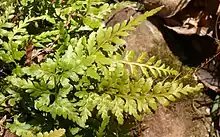| Asplenium adiantum-nigrum | |
|---|---|
 | |
| Scientific classification | |
| Kingdom: | Plantae |
| Clade: | Tracheophytes |
| Division: | Polypodiophyta |
| Class: | Polypodiopsida |
| Order: | Polypodiales |
| Suborder: | Aspleniineae |
| Family: | Aspleniaceae |
| Genus: | Asplenium |
| Species: | A. adiantum-nigrum |
| Binomial name | |
| Asplenium adiantum-nigrum | |
| Synonyms[2] | |
Asplenium adiantum-nigrum is a common species of fern known by the common name black spleenwort.[3] It is found mostly in Africa, Europe, and Eurasia, but is also native to a few locales in Mexico and the United States.[3][4]
Description
This spleenwort has thick, triangular leaf blades up to 10 centimeters long which are divided into several subdivided segments. It is borne on a reddish green petiole and the rachis is shiny and slightly hairy. The undersides of each leaf segment have one or more sori[4] arranged in chains.[5]
Taxonomy
Linnaeus was the first to describe black spleenwort with the binomial Asplenium adiantum-nigrum in his Species Plantarum of 1753.[6]
A chloroplast phylogeny verified the allopolyploid origin of A. adiantum-nigrum, with A. cuneifolium supplying the paternal genome and A. onopteris the maternal genome.[7]
Native distribution
- Asplenium adiantum-nigrum is native to:
- Africa
- Northern and Southern Africa in: Algeria; Lesotho; Morocco; the provinces of South Africa including Eastern Cape, Free State, Gauteng, KwaZulu-Natal, Limpopo, Mpumalanga, Northern Cape, and Western Cape; and Tunisia.
- Asia
- Western Asia and Central Asia in - the Caucasus; Azerbaijan; Cyprus; the Sinai Peninsula of Egypt; Kyrgyzstan; Ciscaucasia and Dagestan in Russia; and Turkey.
- Europe
- Albania; Austria; Belgium; Bulgaria; the Czech Republic; Denmark; Finland; France (including Corsica); Germany; Greece; Hungary; Ireland; Italy (including Sardinia); the Netherlands; Norway; Poland; Portugal, Romania; Spain; Sweden; Switzerland; Ukraine (including Krym); the United Kingdom; and in the Balkan Peninsula (former Yugoslavia)
- Macaronesia
- Macaronesian archipelagoes of: the Azores, Madeira, the Canary Islands.
- North America
- Oceania
In Hawaii, this native fern grows on cinder cones and lava flows,[8] and it is present in Hawaii Volcanoes National Park.[5]
References
- ↑ Asplenium adiantum-nigrum was originally described and published in Species Plantarum 2: 1081. 1753. "Name - Asplenium adiantum-nigrum L." Tropicos. Saint Louis, Missouri: Missouri Botanical Garden. Retrieved November 4, 2011.
Annotation: as "Adiant. nigrum"
- ↑ "Name - Asplenium adiantum-nigrum L. synonyms". Tropicos. Saint Louis, Missouri: Missouri Botanical Garden. Retrieved November 4, 2011.
- 1 2 3 "Asplenium adiantum-nigrum". Germplasm Resources Information Network. Agricultural Research Service, United States Department of Agriculture. Retrieved November 4, 2011.
- 1 2 3 Wagner, Warren H. Jr.; Moran, Robbin C.; Werth, Charles R. (1993). "Asplenium adiantum-nigrum". In Flora of North America Editorial Committee (ed.). Flora of North America North of Mexico. Vol. 2: Pteridophytes and Gymnosperms. New York and Oxford: Oxford University Press.
- 1 2 Esser, Lora L. 1994. Asplenium adiantum-nigrum. In: Fire Effects Information System, [Online]. U.S. Department of Agriculture, Forest Service, Rocky Mountain Research Station, Fire Sciences Laboratory (Producer).
- ↑ Linnaeus, C. (1753). Species Plantarum. Vol. II (1st ed.). Stockholm: Laurentii Salvii. p. 1081.
- ↑ Xu et al. 2020, p. 46.
- ↑ Asplenium adiantum-nigrum. The Nature Conservancy.
- Xu, Ke-Wang; Zhang, Liang; Rothfels, Carl J.; Smith, Alan R.; Viane, Ronald; Lorence, David; Wood, Kenneth R.; Cheng, Cheng-Wei; Knapp, Ralf; Zhou, Lin; Lu, Ngan Thi; Zhou, Xin-Mao; Wei, Hong-Jin; Fan, Qiang; Chen, Su-Fang; Cicuzza, Daniele; Gao, Xin-Fen; Li, Wen-Bo; Zhang, Li-Bing (2020). "A global plastid phylogeny of the fern genus Asplenium (Aspleniaceae)". Cladistics. 36 (1): 22–71. doi:10.1111/cla.12384. PMID 34618950. S2CID 201197385.
